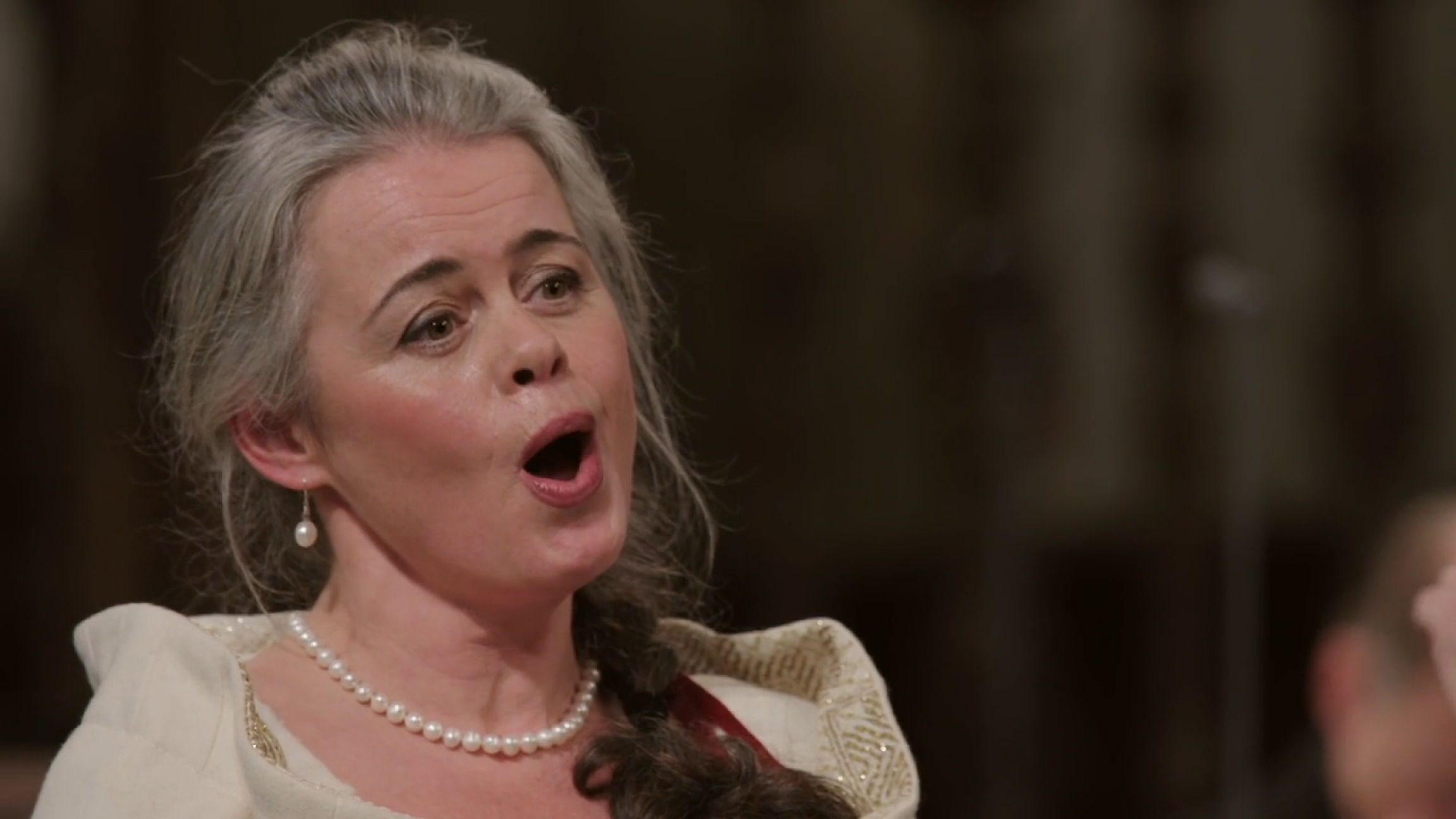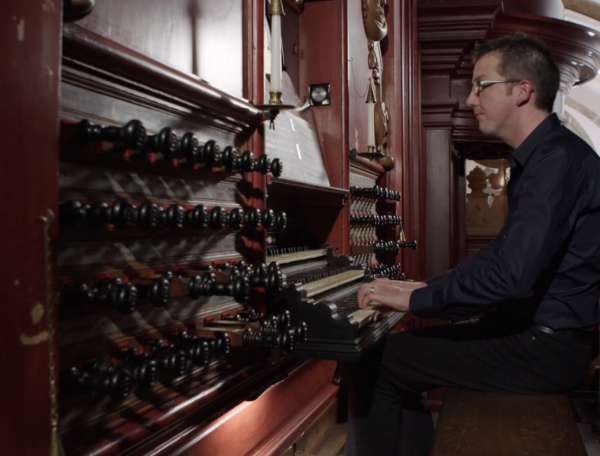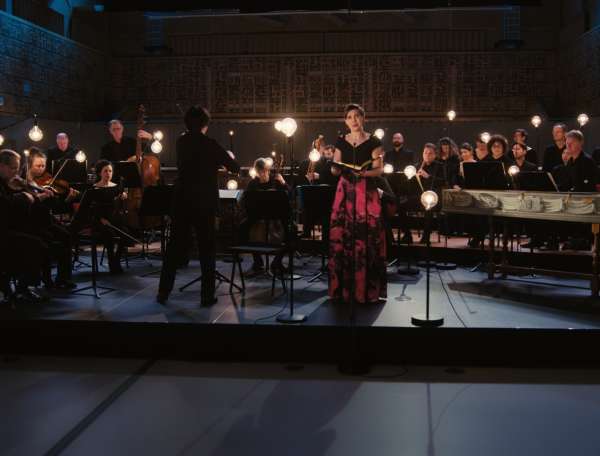

Süßer Trost, mein Jesus kömmt
BWV 151 performed by the Netherlands Bach Society
conducted by Jos van Veldhoven
Grote Kerk, Naarden
Behind the music
Small and full of wonder
Intimate music with one of the most beautiful arias for soprano
This Christmas cantata revolves around amazement and humility. In one of the most beautiful arias ever written by Bach, the soprano expresses wonder at the fragile child in the crib. It opens with a lullaby, accompanied by a flute supported by oboe d’amore and strings. The atmosphere is reminiscent of the pastorale in the second movement of the Christmas Oratorio. In the middle section of the aria, the mood changes to one of joy, and the time signature goes from 12/8 to 4/4.
The intimacy of this cantata is reinforced by the fact that the whole text is written in the first person and that there is no four-part singing, except for the closing chorale. There is, however, a recitative or an aria for each of the soloists. The alto gives a beautiful description of the contrasts in the story of the nativity: the poverty of Jesus brings us riches and his humility brings us salvation. Bach illustrates this with illogical leaps, chromatics and sighing figures. Even the closing chorale is subdued.
Extra videos
Vocal texts
Original
1. Arie (Sopran)
Süßer Trost, mein Jesus kömmt,
Jesus wird anitzt geboren!
Herz und Seele freuet sich,
denn mein liebster Gott hat mich
nun zum Himmel auserkoren.
2. Rezitativ (Bass)
Erfreue dich, mein Herz,
denn itzo weicht der Schmerz,
der dich so lange Zeit gedrücket.
Gott hat den liebsten Sohn,
den er so hoch und teuer hält,
auf diese Welt geschicket.
Er lässt den Himmelsthron
und will die ganze Welt
aus ihren Sklavenketten
und ihrer Dienstbarkeit erretten.
O wundervolle Tat!
Gott wird ein Mensch und will auf Erden
noch niedriger als wir
und noch viel ärmer werden.
3. Arie (Alt)
In Jesu Demut kann ich Trost,
in seiner Armut Reichtum finden.
Mir macht desselben schlechter Stand
nur lauter Heil und Wohl bekannt,
ja, seine wundervolle Hand
will mir nur Segenskränze winden.
4. Rezitativ (Tenor)
Du teurer Gottessohn,
nun hast du mir den Himmel aufgemacht
und durch dein Niedrigsein
das Licht der Seligkeit zuwege bracht.
Weil du nun ganz allein
des Vaters Burg und Thron
aus Liebe gegen uns verlassen,
so wollen wir dich auch
dafür in unser Herze fassen.
5. Choral
Heut schleußt er wieder auf die Tür
zum schönen Paradeis,
der Cherub steht nicht mehr dafür,
Gott sei Lob, Ehr und Preis.
Translation
1. Aria (Soprano)
Sweet comfort, my Jesus comes,
Jesus now is born!
Heart and soul rejoice,
for my dearest God has chosen
me now for heaven.
2. Recitative (Bass)
Rejoice, O my heart,
for the pain shall now ease
which has for so long oppressed you.
God has sent His dearest Son,
whom He holds so high and dear,
into this world.
He leaves the throne of heaven
and would deliver all the world
from its chains of slavery
and servitude.
O wonderful deed!
God is made man and desires on earth
to be lowlier than we
and much poorer.
3. Aria (Alto)
In Jesus’ meekness I can find comfort,
in His poverty riches.
His wretched state reveals to me
naught but salvation and well-being,
yea, His wondrous hand
will weave me naught but garlands of blessing.
4. Recitative (Tenor)
O precious Son of God,
Thou hast opened heaven wide for me
and through Thy humble estate
hath brought the light of bliss to pass.
Since Thou now, all alone,
hast left Thy Father’s citadel and throne
out of love for us,
we would in turn
hold Thee within our hearts.
5. Choral
Today He opens wide again the door
to beautiful paradise,
the cherub stands no more before it,
to God be laud and honour and praise.
translation © Richard Stokes
Credits
-
- Release date
- 1 January 2018
-
- Recording date
- 17 December 2015
-
- Location
- Grote Kerk, Naarden
-
- Conductor
- Jos van Veldhoven
-
- Soprano
- Maria Keohane
-
- Alto
- Alex Potter
-
- Tenor
- Charles Daniels
-
- Bass
- Matthias Winckhler
-
- Violin 1
- Shunske Sato, Annelies van der Vegt, Anneke van Haaften, Lidewij van der Voort
-
- Violin 2
- Sayuri Yamagata, Pieter Affourtit, Paulien Kostense
-
- Viola
- Staas Swierstra, Jan Willem Vis
-
- Cello
- Lucia Swarts, Richte van der Meer
-
- Double bass
- Robert Franenberg
-
- Traverso
- Frank Theuns
-
- Oboe
- Martin Stadler
-
- Harpsichord
- Siebe Henstra
-
- Organ
- Pieter-Jan Belder
-
- Director and editor
- Joost Honselaar
-
- Assistant director
- Ferenc Soetman
-
- Music recording
- Guido Tichelman, Bastiaan Kuijt, Micha de Kanter
-
- Camera
- Jochem Timmerman, Rene Holbrugge, Martin Struif, Chris Reichgelt
-
- Lights
- Zen Bloot, Patrick Galvin, Henry Rodgers, Emiel van Geenen
-
- Set and video technique
- Justin Mutsaers, Glenn van den Eerden
-
- Data handling
- Charlotte Storm
-
- Project manager dutchview
- Peter Ribbens
-
- Interview
- Onno van Ameijde
-
- Producer concert
- Marco Meijdam
-
- Producer film
- Jessie Verbrugh, Imke Deters
-
- Acknowledgements
- Angela Mast

